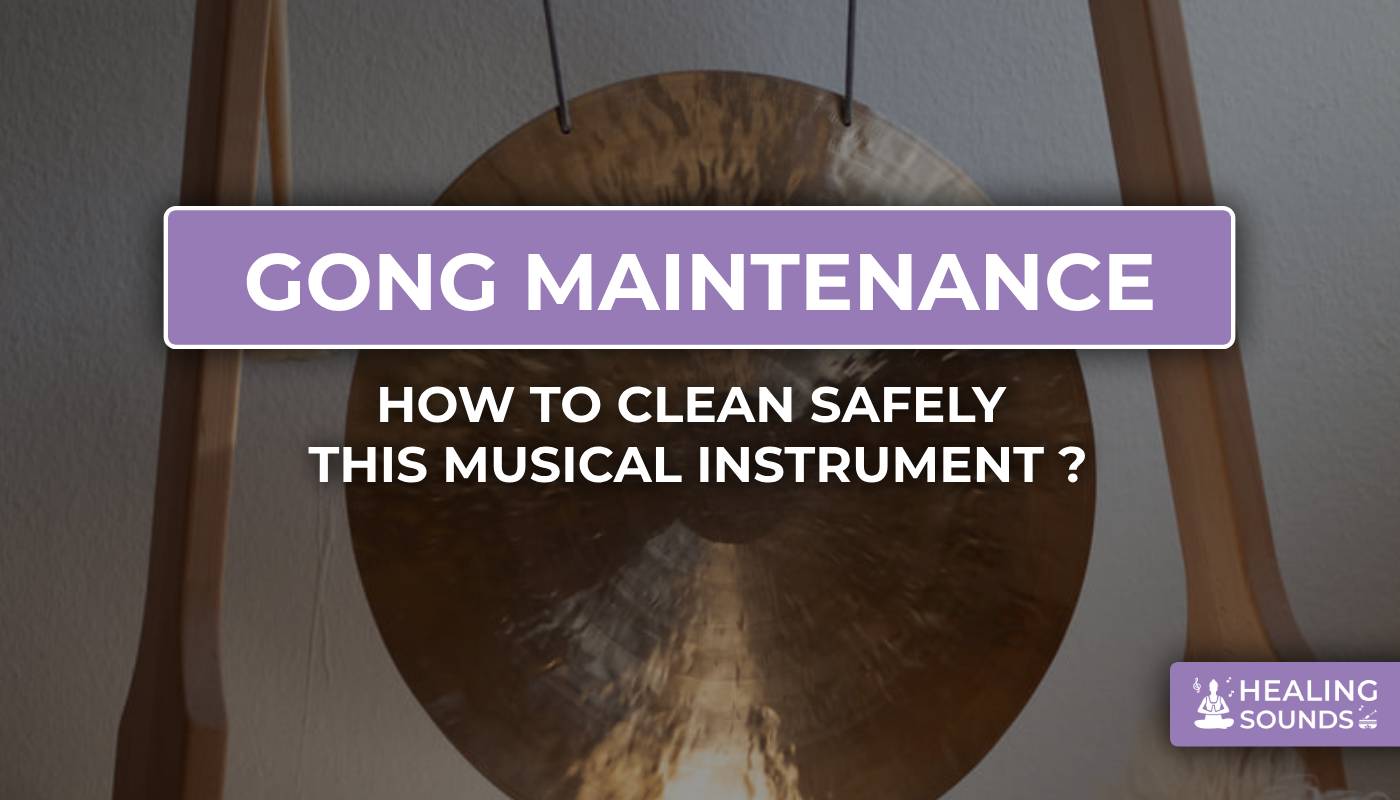Your gong is more than just an instrument; it's a source of profound sound, resonance, and potentially healing vibrations. Ensuring its longevity and pristine sound quality requires dedicated gong care and proper gong maintenance. Whether you're a seasoned musician cherishing your instrument or new to the world of gongs, understanding effective gong cleaning techniques is essential. This guide provides ultimate tips for keeping your gong in optimal condition for years to come.

Why Proper Gong Care is Crucial
Consistent gong care does more than just maintain appearance. It directly impacts the instrument's acoustic properties. Dust, fingerprints, and oxidation can accumulate over time, potentially dampening vibrations and altering the complex harmonics that make each gong unique. Proper gong maintenance ensures your instrument continues to produce its full, rich, and intended sound.
Understanding Your Gong's Material
The first step in effective gong maintenance is knowing your instrument's composition. Most traditional gongs, like many found at Healing Sounds, are crafted from bronze—an alloy primarily of copper and tin. Bronze is known for its resonant qualities but requires specific cleaning techniques for gongs to avoid damage and maintain its integrity and sound.
Other materials might be used, but cleaning bronze gongs often involves similar principles: gentleness and the avoidance of harsh chemicals or abrasives. For detailed information on metal conservation, resources like the Canadian Conservation Institute Notes on Caring for Copper, Brass, and Bronze can be insightful.
Essential Gong Cleaning Techniques
Integrating cleaning into your routine is key for gong longevity. Here’s how to approach it:
Routine Dusting and Wiping
Regular, light cleaning prevents buildup. At least once a week, gently wipe the entire surface of your gong with a soft, clean, dry microfiber cloth. This simple step removes dust and minor smudges before they become ingrained.
Deep Cleaning Your Gong Safely
For a more thorough clean, needed perhaps every few months or if the gong has visible grime or tarnish, follow these steps:
- Choose the right cleaner: Select a non-abrasive gong cleaner specifically designed for bronze or delicate metals. Avoid household cleaners which can be too harsh.
- Apply sparingly: Dampen a soft, clean cloth slightly with the cleaner – never apply cleaner directly onto the gong.
- Gentle rubbing: Using gentle, circular motions, wipe the gong surface. Do not scrub vigorously.
- Remove residue: Use a separate clean, dry microfiber cloth to wipe away all traces of the cleaner.
- Final polish: A final wipe with another dry, soft cloth can restore shine.
Watch this video for a visual guide on the difference cleaning can make:
What to Avoid: Common Gong Cleaning Mistakes
Knowing what *not* to do is as crucial as knowing the correct cleaning techniques for gongs. Avoid these common pitfalls:
- Abrasive Materials: Never use steel wool, scouring pads, or abrasive cloths. These will permanently scratch the gong's surface.
- Harsh Chemicals: Avoid acidic or highly alkaline cleaners, ammonia, bleach, or general-purpose metal polishes not specifically meant for bronze musical instruments. They can damage the finish and alter the metal's patina.
- Excessive Water: Do not soak your gong or use excessive amounts of water, especially near suspension holes where moisture can get trapped.
- Aggressive Polishing: Over-polishing can wear down the metal over time and potentially remove desirable patina that contributes to the gong's character.

22" Chinese Gong for Enhanced Sound - Includes Beater
$359.90
Starting your sound journey? This 22-inch gong offers deep, resonant tones. Proper gong care will ensure its beautiful sound lasts.
Explore this GongProper Gong Storage for Longevity
Where you keep your gong when not in use significantly impacts its gong preservation. Follow these storage tips:
- Environment: Store your gong in a dry, cool place with stable temperature and humidity. Avoid damp basements, hot attics, or areas with direct sunlight.
- Covering: Use a soft, breathable cover or a dedicated padded gong bag. This protects from dust and accidental scratches. Avoid plastic wraps which can trap moisture.
- Hanging vs. Standing: If hanging, ensure the stand or ropes are secure and distribute weight evenly. If storing upright on a stand, ensure it's stable.
Handling Your Gong With Respect
Minimize direct skin contact with the gong's main surface, as oils from your hands can accelerate tarnishing.
- Clean Hands: Always handle your gong with clean, dry hands or wear soft cotton gloves.
- Lifting: Lift the gong by its edges or suspension ropes/holes, not by pressing on the face.
- Transport: When moving your gong, always use a padded bag or case specifically designed for it to prevent dents, scratches, and impacts.
Regular Inspection: Catching Issues Early
Make it a habit to visually inspect your gong regularly, perhaps during your weekly dusting. Look for:
- Early signs of corrosion or excessive tarnishing.
- Any new scratches, dents, or warping.
- Changes in the patina or finish.
- Check the suspension cords for wear and tear.
Catching these issues early allows for timely intervention, preventing minor problems from becoming major ones and preserving the gong longevity and sound quality.
Explore Our Handcrafted Gongs
A complete set producing exceptional sound, worth preserving with effective gong cleaning. Learn more ➔

32" Chinese Gong with Beater
$1099.90
This professional-grade instrument demands consistent gong care to maintain its superior timbre. Learn more ➔

40cm Nepalese Gong Instrument for Sound Healing
$359.90
$469.90
Crafted from brass, this unique gong requires specific bronze cleaning knowledge for proper upkeep. Learn more ➔
When to Seek Professional Gong Maintenance
While routine gong care can be managed at home, some situations require expert attention. Consult a professional specializing in musical instrument repair or restoration if you notice:
- Significant dents, cracks, or warping.
- Stubborn corrosion or damage that doesn't respond to gentle cleaning.
- A noticeable and persistent change in the gong's sound quality.
Attempting complex repairs without expertise can cause irreversible damage. Professionals have the tools and knowledge for specialized gong maintenance and repair.
Conclusion
Effective gong maintenance is an act of respect for your instrument and the powerful sound it produces. By incorporating regular, gentle gong cleaning, mindful handling, proper storage, and timely inspections into your routine, you ensure its vibrational integrity and gong longevity. Cherish your gong, care for it well, and it will continue to enrich your sonic landscape for many years. Explore our collection at Healing Sounds to find the perfect gong instrument for your journey.
Frequently Asked Questions about Gong Maintenance & Cleaning
The best cleaner is a non-abrasive one specifically formulated for bronze or delicate metals. Avoid harsh household chemicals. Always test in an inconspicuous area first and use sparingly with a soft cloth.
For routine cleaning (weekly), wipe gently with a dry microfiber cloth. For deep cleaning (every few months or as needed), use a soft cloth slightly dampened with a suitable non-abrasive bronze cleaner, rub gently in circular motions, and wipe off thoroughly with clean, dry cloths. Always avoid abrasive materials.
The 20/10 rule typically refers to a general house cleaning method (work for 20 minutes, rest for 10) and isn't specific to gong cleaning. For gongs, focus on regular gentle wiping and occasional careful deep cleaning rather than timed intervals.
Improve your gong cleaning skills by understanding your gong's material (likely bronze), always using soft cloths and appropriate non-abrasive cleaners, practicing gentle techniques, and learning what to avoid (abrasives, harsh chemicals).
Avoid using abrasive materials like steel wool or scouring pads, harsh chemicals (ammonia, bleach, acidic cleaners), excessive water, and aggressive scrubbing or polishing. Also, minimize touching the main surface with bare hands.



